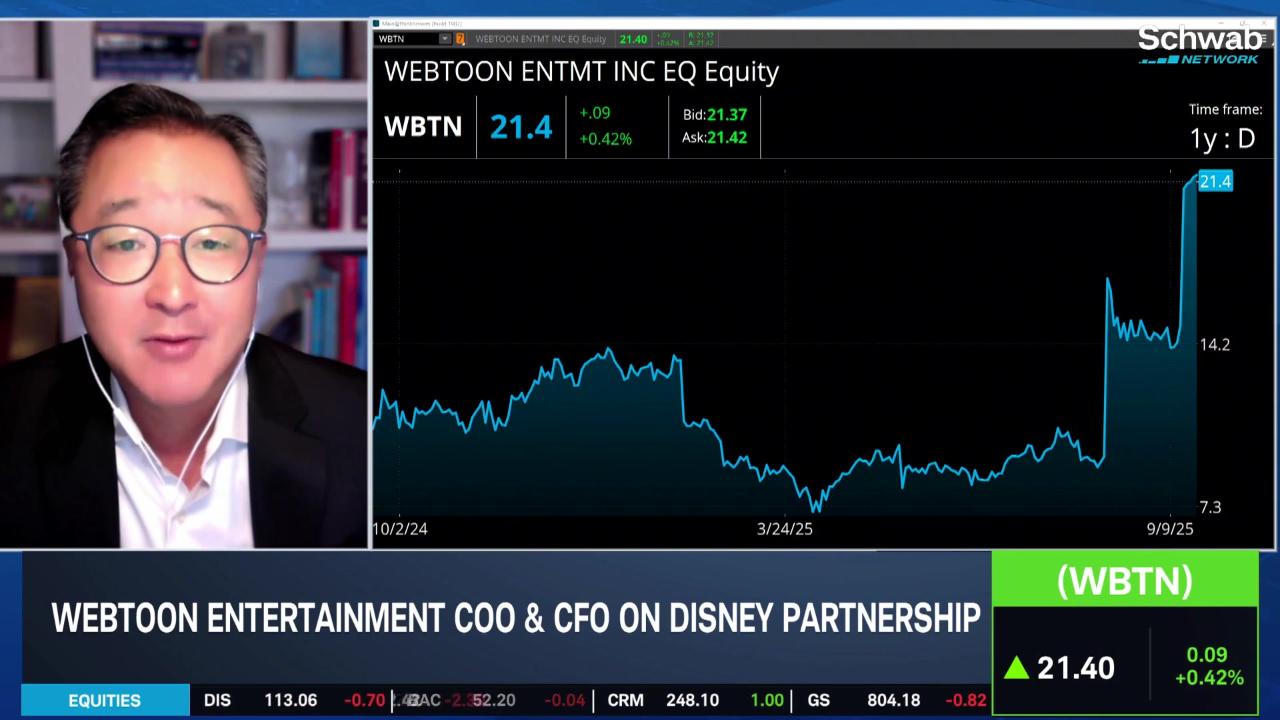- Market Minute
- Posts
- Webtoon (WBTN) & the Democratization of Media
Webtoon (WBTN) & the Democratization of Media

Webtoon’s (WBTN) COO & CFO, David Lee, joined Trading 360 to discuss its business and its new deal with Disney Comics.
Anyone who’s been on the internet is familiar with webcomics – comic strips or graphic novels native to the web rather than print.
The internet democratized the art form in an incalculable way, allowing anyone who could draw a stick figure and write a joke to try their hands at a medium that was otherwise restricted to newspaper funnies or cheaply-printed issues controlled by a few major publishers.
The advantage of traditional publishing for artists is its distribution and advertising resources – and for the audience, it signals at least one layer of gatekeeping for quality. The disadvantage is that it may lock many talented artists out of the market by virtue of that same gatekeeping and leaves out content niches readers want but may not fit with a mainstream narrative.
Setting up your own website for your comic is easy. Spreading the word and finding a dedicated audience is hard, especially in today’s internet, where people find things through snippets on social media or search engine popularity algorithms.
Webtoon functions in the middle of this ecosystem, offering comic building tools and creating a central hub for readers – and even media movers and shakers (see the success of Lore Olympus) – to find new work and re-access old favorites. “Increasingly these stories turn into movies, films, TV series, games, merchandise…” Lee says.
One could argue that the Webtoon model is a little like Reddit (RDDT) – it relies on user-created content and user interaction to keep the machine running. Lee partially credits its vertical format for facilitating this.
Webtoon has no barrier to entry: anyone can sign up and get going within minutes, and it offers plenty of advice on monetization on its main site. Its investor relations page boasts a staggering 24 million creators making 450K+ webcomic stories for 155 million monthly active users. “Most of these creators have full time jobs” outside of webcomics, Lee says.
How do creators make money? Again, similar to content sites like YouTube, Webtoon requires a comic to hit a certain number of likes to become eligible for a “Super Like” program, where readers can pay to give a comic “Super Likes” to become a “Super Fan,” which translates to better visibility for their comments – and for the comic itself as it moves up internal rankings. Webtoon takes a 30% cut.
This creates an enmeshed ecosystem of creators and fans, the webcomic version of Twitch streaming. It also constitutes a “freemium” version of, say, going to the comic store to buy the latest issue of Batman. Webtoon also allows creators to link to Patreon and shares ad revenue.
Looking at its main page, the most popular genre appears to be romance or romantasy, and it heavily favors the anime style. Based on its quarterly report, the biggest parts of their user base come from Korea and Japan.
While romance is often sneered at in creative circles, it is genuinely a money-generating machine. Romance readers tend to want lots of content quickly, with an impatience not found in other genres. (Notably, AI generation is pretty good at the anime style.)
However, Webtoon clearly doesn’t want that to be its main identity – hence a partnership with Disney Comics, which owns properties like Marvel and Star Wars (the latter of which has a long, strong comics history). This gives them an air of legitimacy and quality consumers might not otherwise feel, and access to significant content archives.
“We think that this is a great way to continue the growth” of Webtoon, Lee says, and the deal gives Disney (DIS) an option to take a 2% stake. Lee adds that they have a “great relationship” with Disney. Webtoon also has partnerships with major publishers like IDW and Darkhorse.
Looking at Webtoon’s latest quarterly earnings, 2Q25, it posted adjusted EPS of $0.07 and revenue of $348.3 million, both of which beat Street estimates. It posted a net loss of $3.9 million but has $581.5 million on its balance sheet in cash and cash equivalents. It also says it carries no debt.
Paid content revenue leads the mix, with smaller advertising and IP adaptations segments. Average Revenue Per Paying User (ARPP) was $7.90 for Korea, $23.70 for Japan, and $6.60 for the rest of the world, all of which grew year-over-year.
The stock itself is up over 80% since last year and over 45% year-to-date, soaring after the Disney announcement. However, after a 52-week high on September 19, shares are seeing a slump.
The media landscape is evolving faster than people realize, and many artworks or stories can be genuine international hits – but still live under the radar without an advertising machine behind them. Webtoon offers investors a chance to support these types of art and, with the Disney partnership, dip their toes into some of the cornerstones of comics.
Watch the full interview below:
Video Spotlight
Featured Clip
Tune in live from 8 a.m. to 5 p.m. ET, or anytime, anywhere, on‑demand.
Or stream it via thinkorswim® and thinkorswim Mobile, available through our broker-dealer affiliate, Charles Schwab & Co., Inc
Please do not reply to this email. Replies are not delivered to Schwab Network. For inquiries or comments, please email [email protected].
See how your information is protected with our privacy statement.
Charles Schwab and all third parties mentioned are separate and unaffiliated, and are not responsible for one another's policies, services or opinions. Schwab Network is brought to you by Charles Schwab Media Productions Company (“CSMPC”). CSMPC is a wholly owned subsidiary of The Charles Schwab Corporation and is not a financial advisor, registered investment advisor, broker-dealer, or futures commission merchant.

